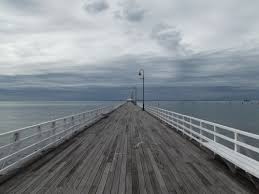记忆方法
将“pier”记忆为“pie”加上一个“r”结尾,想象它像一块“pie”(派)插在水面上,形成码头或桥梁的意象,这样可以帮助记住它的含义。
以上内容由AI生成, 仅供参考和借鉴
中文词源
pier 突堤,突码头
来自拉丁语pera,堤,码头,来自petra,石头,词源同petrology,petroleum.
英语词源
- pier (n.)
- mid-12c., "support of a span of a bridge," from Medieval Latin pera, of unknown origin, perhaps from Old North French pire "a breakwater," from Vulgar Latin *petricus, from Latin petra "rock" (see petrous), but OED is against this. Meaning "solid structure in a harbor, used as a landing place for vessels," is attested from mid-15c.
权威例句
- 1. The ship was moored broadside to the pier.
- 这艘船横泊在码头旁。
- 2. We stood on the pier and watched as they embarked.
- 我们站在突码头上目送他们登船。
- 3. The motorboat put on speed as soon as it left the pier.
- 汽船一离开码头就加快了速度.
- 4. The salvage was piled upon the pier.
- 抢救出的财产被堆放在码头上.
- 5. The warship was making towards the pier.
- 军舰正驶向码头.
